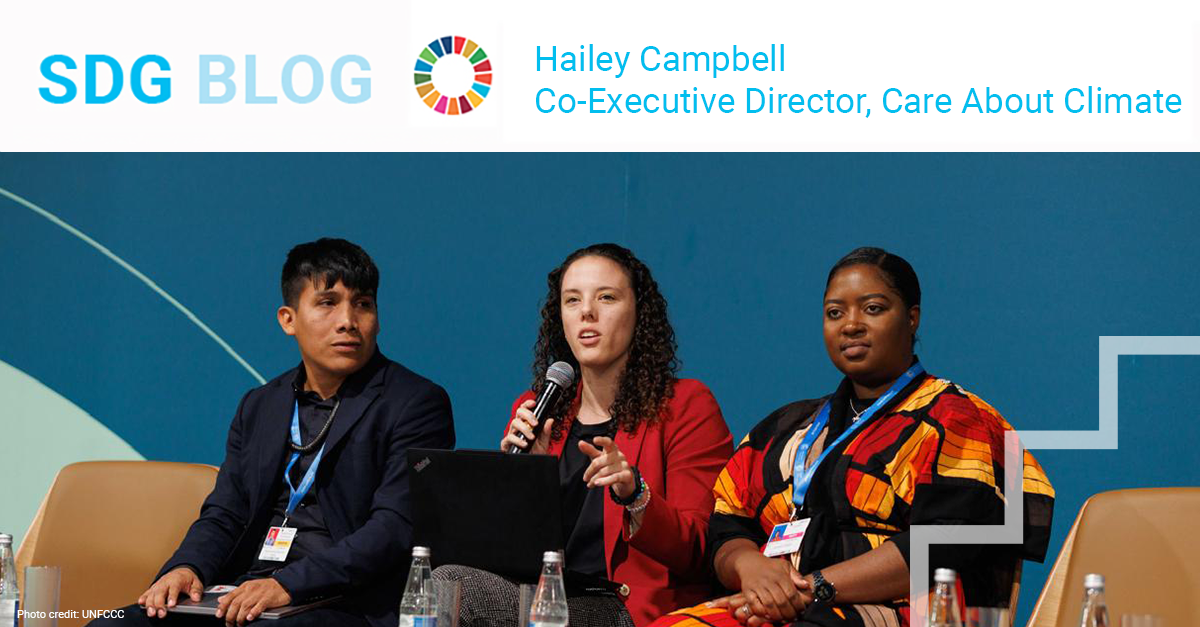SDG Blog

Rio's future generations are here: It's not game over for climate action; it's game on
By Hailey Campbell, Co-Executive Director, Care About Climate
For every single person alive today, we will leave behind a shared legacy to future generations. Will that future be defined by fear of the catastrophic climate impacts or the rights to a clean, safe, sustainable environment?
Thirty years and 29 UN Climate Conferences ago, world leaders gathered in Rio, Brazil to promise intergenerational equity, restore balance with nature, and fight climate change. World leaders promised to ensure "that current actions do not compromise the needs of future generations".
The future generations of the Rio conference are here. Young people under the age of 30 represent nearly 50 per cent of the global population. To us, it's clear that the Rio promises of intergenerational equity and climate action have been broken.
For many of us in this generation, we've taken matters into our own hands. In addition to school, work, and managing the cost of living crisis, we've started non-profits to fight climate change and gain access to the exclusive UN spaces in attempts to outnumber the 1700+ fossil fuel lobbyists at COPs. We've trained ourselves to build relationships and engage in negotiations as observers to the multilateral climate processes. And, we've organized to hold the line on tackling climate change such that future generations after us have the opportunity to live in a clean, safe, sustainable world that we were promised. All of this, almost entirely as volunteers.
At COP29 – my fifth COP – I spent over 60 hours in climate negotiations. For people in my generation, the outcomes were yet another betrayal of our future. It took 28 COPs to secure even a single mention of fossil fuels and the need to transition away from them, despite decades of global awareness of their impact on the planet.
COP29 failed to deliver the necessary trillion-dollar grants and public-based finance goal, a place to continue discussions on how to transition away from fossil fuels as agreed at COP28, and a work programme aimed at sharing best practices to mitigate climate change. Throughout every agenda item, it seems as though more time was spent defending against backsliding on previous agreements than it was advancing ambitious action that meets the needs of the most vulnerable communities.
When every single country effectively holds a veto and the Presidency is led by those keen to proliferate fossil fuel extraction, it’s no surprise that the same side keeps winning. Despite all the reasons to abandon COPs, we keep coming back—not just because leaving the multilateral process would embolden wealthy and oil-rich nations, but because the community we’ve built through these negotiations is a source of strength, solidarity, and hope. It reminds us that even in the face of broken promises and slow progress, countless people around the world remain committed to fighting for climate justice.
At COP29, one of the brightest moments of hope came from the launch of the Universal NDC Youth Clause, informed by climate policy experts on my team at Care About Climate. This clause is a call to action for governments to recognize that an intergenerational challenge demands intergenerational leadership. Specifically, it urges governments to accelerate intergenerational partnerships in climate policymaking and implementation by embedding principles of intergenerational equity into their Nationally Determined Contributions (NDCs) under the Paris Agreement. During the height of negotiations, the United Kingdom became the first government to adopt the Youth Clause, offering excitement and hope for a shift in intergenerational climate governance.
Beyond the Youth Clause, I was inspired by the dozens of youth staying up until 2am following negotiations and building cross-constituency partnerships to amplify calls to action. From signs on bathroom stalls and on laptops to policy briefs for negotiators, young people refused to let their future and that of the most vulnerable communities go down without a fight. Though COP has come to another disappointing close, we continue this fight at home, already preparing for the negotiations and climate actions needed in the coming year.
COP30 will return us to Brazil, the birthplace of the climate promises to my generation. As a member of the generation that Rio promised to protect, we look to global leaders and demand better. Though we turn to multilateral processes to provide guidance, it's important to remember that governments don't require a multilateral agreement to demonstrate climate leadership.
Future generations cannot afford another failure. Will 2025 and COP30 finally deliver on the promises of Rio, or will next year be remembered as yet another missed opportunity? The choice is theirs. The consequences are ours.
* The views expressed in this blog are the author’s and do not necessarily reflect the opinion of UN DESA.
 Welcome to the United Nations
Welcome to the United Nations